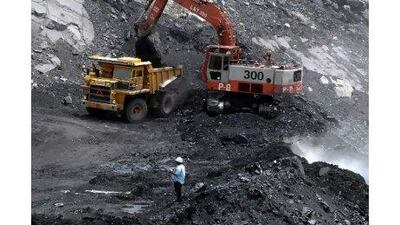MUMBAI // India's plans to require mining corporations to share more than a quarter of their profits with indigenous populations uprooted by their operations has sparked concerns about the future of the country's US$35 billion (Dh128.56bn) mining business.
The Federation of Indian Mineral Industries, an association of mining companies, has described the proposal as the "death knell" of the industry, reckoning that the legislation would significantly dent profits and discourage much-needed foreign investment.
The mining bill, which was approved by the government last week and is scheduled to be presented in parliament this year, mandates that coal miners share 26 per cent of their profits with people displaced by their operations.Miners of other mineral resources will be required to pay local inhabitants an amount equal to the royalty tax charged by the government for mining operations.
Prakash Jaiswal, India's coal minister, says the new proposal will yield 110bn rupees (Dh9.08bn) to help relocated indigenous tribes.
India is endowed with vast reserves of rich mineral deposits, which in recent years have attracted industrial concerns such as South Korea's Posco and the London-listed Vedanta.
But India's mineral-rich lands are home to its poorest people. Mining giants have seldom shared their huge profits, antagonising local communities, many of which have refused to relinquish their lands for mining operations.
The Centre for Science and Environment (CSE), a research and advocacy organisation based in New Delhi, says mining uprooted about 2.6 million people between 1950 and 1991.
Not even a quarter of them have been resettled.
For every 1 per cent of the mining industry's contribution to India's GDP, the CSE says, "it displaces three to four times more people than all development projects put together".
The disenchantment with mining giants has also fanned a violent Maoist insurgency, also called Naxalism, in 22 of India's 28 states.
The left-wing insurgents are most active in 11 of these states stretching through much of eastern and central India, a mineral-rich region known widely as the "red corridor".
BK Handique, a former mines minister, said in office last year that he sought to make the levy a "social licence" for future mining leases.
Welcoming the proposed legislation, the CSE said it was the "first step towards repairing and repaying the damages done to poor communities living on mineral-rich lands".
Mr Jaiswal hopes the new proposal will speed up the approval of land clearances for industrial purposes. Currently, industrial projects worth $150bn are on hold because of hurdles in acquiring land, according to the Associated Chambers of Commerce and Industry of India.
But the move is staunchly opposed by the mining industry.
"No shareholders would like to invest where 26 per cent of the shareholders do not make any contribution to the company," the Federation of Indian Chambers of Commerce and Industry wrote last year in a letter to Pranab Mukherjee, the finance minister. "The idea of profit-sharing will not benefit local communities," says Sebastian Morris, a professor at the Indian Institute of Management, Ahmedabad. "Mining companies could manipulate profits to deny landowners a share of it.
"Locals will have no control over company accounts and so this proposal will not work in their favour."
A much preferred option, he says, is to carry competitive bidding for mining contracts, similar to the auctioning of mobile spectrums to telecommunications companies, which has earned the government a windfall in recent years.
"The [mining] windfall could then be used by the government to compensate local land owners," Prof Morris says.

